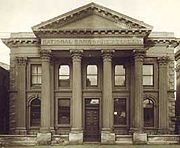- Demand deposit
-
Types of banksCentral bank
Advising bank · Commercial bank
Community development bank
Cooperative bank · Credit union
Custodian bank · Depository bank
Export credit agency
Investment bank · Industrial bank
Merchant bank · Mutual savings bank
National bank · Offshore bank
Postal savings system
Private bank · Retail Bank
Savings and loan association
Savings bank · Universal bank
more...Bank cardsBanking termsLoan · Money creation
Automatic teller machine
Bank regulation · Anonymous banking
Islamic banking · Private banking
Ethical bankingDemand deposits or bank money are funds held in demand deposit accounts in commercial banks.[1] These account balances are usually considered money and form the greater part of the money supply of a country[2].
Contents
History
Traditionally, demand deposits only referred to funds held in checking accounts (or cheque offering accounts), however, financial innovation has allowed easier access to funds from other types of accounts (e.g. savings accounts, money market account), and these funds are sometimes also referred to as demand deposits.
In the United States, demand deposits arose following the 1865 tax of 10% on the issuance of state bank notes; see history of banking in the USA.
Money Supply
Demand deposits are usually considered part of the money supply, as they can be used, via checks and drafts, as a means of payment for goods and services and to settle debts. The money supply of a country is usually held to consist of currency plus demand deposits. In most countries, demand deposits account for a majority of the money supply[2].
During times of financial crisis, bank customers will withdraw their funds in cash, leading to a drop in demand deposits and a shrinking of the money supply. Economists have speculated that this effect contributed to the severity of the Great Depression.[3]
This did not happen, however, in the financial crisis that began in 2008. In fact, demand deposits in the U.S. increased dramatically, from around $310bn in August 2008 to a peak of around $460bn in December 2008.[4]
See also
- Liquidity
References
- ^ "Bank Money: Merriam-Webster Dictionary". www.merriam-webster.com. http://www.merriam-webster.com/dictionary/bank+money. Retrieved 2009-08-19.
- ^ a b Krugman, Paul R., and Robin Wells. Economics. New York: Worth, 2006. Print.
- ^ Friedman, Milton (November 1, 1971). Monetary History of the United States, 1867-1960. Princeton University Press. ISBN 0691003548.
- ^ "Federal Reserve Bank statistics". www.federalreserve.gov. http://www.federalreserve.gov/releases/h6/hist/h6hist7.htm. Retrieved 2010-03-18.
Categories:- Banking
- Monetary reform
Wikimedia Foundation. 2010.

